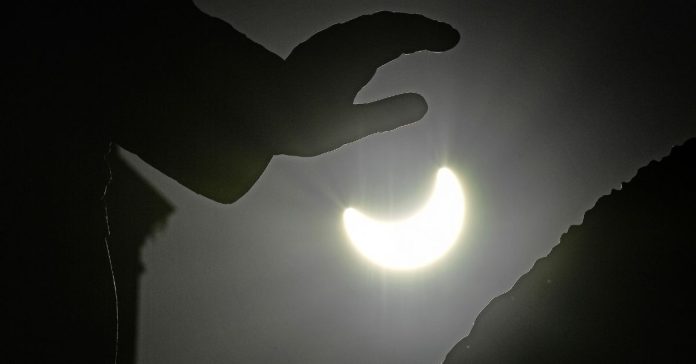
Partial solar eclipse seen near Monument to Marshal Georgy Zhukov on Manezhnaya Square in Russia October 25, 2022. (Igor’ Ivanko/Kommersant/Sipa USA) (Sipa via AP Images)
A group of inmates who want to see the upcoming solar eclipse on April 8 have sued the New York Department of Corrections in federal court, alleging that a recently-imposed ban on inmates from the yard at an upstate facility during the rare celestial event is a violation of their respective religious freedoms.
The plaintiffs are Jeremy Zielinski, Travis Hudson, Bruce Moses, Oscar Nunez, Jean Marc Desmarat, and David Haigh and all are inmates at the Woodbourne Correctional Facility in upstate New York. For plaintiffs Hudson and Hugh, a Baptist and Seventh-day Adventist respectively, they say viewing the solar eclipse is tied right into their faith. In the complaint they note that in the Bible, it was a solar eclipse that may have passed over Christ himself when he was crucified, according to passages in Mark and Luke.
Hudson says he regularly attended church in Lake Placid and attended prayer walks before he was incarcerated. By viewing the eclipse, it is a way to “find the Spirit of God” in natural events, he says. Hugh feels similarly, telling the court that he was once a member of the Campus Crusade for Christ at Penn State and Purdue Universities and now that he is in imprisoned, he attends church services within the facility weekly.
Another plaintiff who is Muslim, Jean Marc Desmarat, maintains that his Islamic faith has long connected the importance of the eclipse into its practice. It is necessary to rejoice with others in what he believes is Allah’s creation, he claims, saying that a special prayer in view of the eclipse must also be made, “just as he believes the Prophet Muhammad prayed.”
Santeria practitioners and inmates Bruce Moses and Oscar Nunez argue it is their religious right to view the eclipse with their own eyes because viewing, they must pray, hopefully leading to “vibrations of the Orishas,” or divine spirits, who can bless and help them.
Only one plaintiff in the claim is an atheist: Jeremy Zielinski. As an atheist, his beliefs involve observing the solar eclipse in the presence of others who “gather to celebrate science and reason.”
The last solar eclipse occurred in 2017; after the next one on April 8, it will not happen again until 2044.
According to the complaint, Zielinski first made a request to officials at the Woodbourne facility on Jan. 28. Two days later, he was told he would need to provide an official request form for the facility to recognize his religion, atheism, as “an official religion” before going any further. He submitted the form by Feb. 19 but it was not until March 4 that Zielinski says he was told a determination on his request could take as long as 120 days, long after the eclipse had come and gone.
Within a day, however, Zielinski’s lawyers say he received confirmation to watch the eclipse and he was even provided with special viewing glasses to protect his eyes. But when he next asked if he would renew his request formally with other inmates who held sincere religious beliefs, a memorandum announcing a lockdown went out en masse.
The March 11 memo from acting commissioner David Martuscello III officially banned “incarcerated movement in facilities from 2:00 p.m. to 5 p.m.” on April 8 and further required that all inmates stay inside of their individual housing units.
For facilities in the “path of totality,” or areas where the sun will be completed blocked out by the moon, visitation was also canceled. The plaintiffs say in 2017 there was no lockdown at all.
Confusingly, the plaintiffs say the same memo also stated that the department had “placed an order to purchase and distribute solar eclipse glasses” for those in the path of totality.
Zielinski says he filed two grievances with Woodbourne officials that went ignored after the memo was issued. Things didn’t fare any better for one of his Baptist co-plaintiffs Travis Hudson, when Hudson filed his own request to view the eclipse. The facility superintendent told Hudson on March 14, the complaint alleges, that officials were unable to find any “recorded holy day” for Baptists in the facility’s calendar.
The same response was given to almost everyone else regardless of the religion they practiced. One of the plaintiffs, however, never received a response at all after he made a request on March 15.
Zilenski says that he received at least one letter after he was denied but it only informed him that he would soon receive a response from the prison’s grievance program. He never did, the complaint alleges.
The complaint seeks emergency relief to restore their religious rights and also demands inmates be able to view the April 8 eclipse and receive glasses to do so.
A review of the docket on Wednesday shows lawyers for the parties were expected to meet Wednesday afternoon for a telephone conference.
Attorneys did not immediately respond to request for comment.
A department spokesperson also did not immediately return a request for comment on how the eclipse may prompt guards or correctional staff to act any differently than they would when the facility is otherwise shrouded in darkness for long periods, including overnight as inmates sleep.
Have a tip we should know? [email protected]

